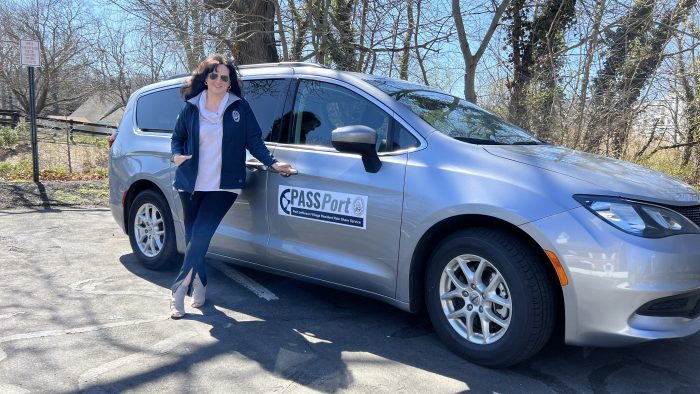Port Jeff Village to pioneer PASSPort, a municipally operated rideshare service

Village of Port Jefferson officials are currently rolling out PASSPort, a first-of-its-kind rideshare service tailored for within-the-village transit.
Kevin Wood, the parking and mobility administrator in PJV, worked closely with the village Board of Trustees to develop the software and systems to accommodate PASSPort. Now the service is undergoing beta testing, with plans for public use along the horizon.
PASSPort functions similarly to other popular platforms in the private sector, tapping into the same technologies used by services such as Uber but repurposing them for local municipal oversight and administration.
Under the current plan, Wood said the program remains flexible, subject to villagers’ evolving needs. “There is no parallel to this on Long Island,” he said.
While the village has attempted to administer similar transit services in the past, Wood held that PASSPort represents a significant departure from any past or current offerings. “The closest you came to this were crosstown electric car methods that, in Port Jefferson, have proven to not work for various reasons,” he said.
He added that through PASSPort, the village government hopes to move away from the public perception surrounding those previous models, which he said were ill suited for winter weather and unable to traverse the area’s steep hills.
Wood noted the various opportunities for residents to make use of PASSPort. According to him, the platform could potentially enhance mobility for those traveling to village beaches, elderly residents unable to operate a car and residents traveling downtown.
Although some apps, such as Uber, bar minors from accessing their service, Wood kept open the possibility in Port Jeff, saying that the village is working through legal parameters of creating a parental authorization process to enable the pickup and drop-off of local students.
The parking and mobility administrator also touched upon the subject of PASSPort vehicle operators. For him, the vehicles would ideally be operated by professional, third-party drivers who would be “exclusive to us for that night” during a designated period.
“We want them to have a certain amount of professional aspect to what they’re doing,” he said. “That’s an important part of this — to monitor not only the integrity of the service itself and timeliness but the courtesy of the driver.” Given the program’s flexibility, he said he could foresee accommodating multiple drivers a night if needed.
Pricing is also variable, with Wood hoping to learn more about this facet of the program as the program rolls out for public use. Measuring PASSPort against taxicabs and other rideshare methods, he foresees clear advantages to the village program.
“We know that if you took a taxi, that would be … one, a different experience; two, they’d have to be available; and three, that price, I understand, is between $7 and $10,” he said. “We think we’re coming out with a more efficient service, much better technology and we’re still pricing it at the $5 to $8 per person level.”
While PASSPort unleashes private sector technologies for municipal administration, Wood suggested the program is not necessarily intended to outcompete rival services. Instead, he viewed the platform as a village service.
“We’re not in the business of competing with mobility — we’re in the business of serving our residents,” he said. “If someone chooses us over [other rideshare service providers], it’s because of safety, efficiency, pricing and you’re going to see a whole lot of promotion.”
Moreover, Wood said he believes the broader trends are gradually shifting away from individually operated motor vehicles, accelerated by myriad factors, such as congestion pricing and rising costs associated with vehicle maintenance.
“Owning a car today is almost becoming a liability because of insurance costs, gas and all the things associated with it,” he said. “I think ‘mobility’ is the keyword you want to use here — getting to where you have to go in the most efficient way possible.”
Wood, who worked in the technology and marketing sectors before entering the administration, said he discovered a natural blend of his professional experiences while creating the rideshare service.
Through PASSPort, he said village leaders could effectively boost mobility by integrating new tech and municipal administration. He indicated that rideshare programs such as PASSPort represent the future of municipal servicing.
“I love to see the world of technology and entrepreneurial thinking coming to the government,” he said. “Why not adapt and engage with technology?”
Deputy Mayor Kathianne Snaden, trustee liaison for parking and mobility, has closely coordinated with Wood in launching the service, expressing optimism for its implementation.
“We’re thrilled for this program,” she said. “We saw a need for residents to be able to visit their downtown. Downtown is not just about the tourists, it’s about the residents.”
The deputy mayor also noted that PASSPort could ease the burden of transit on residents and parking congestion on businesses, saying, “They don’t have to worry about bringing their cars down or about parking. They can get to and from in a safe manner, and it will additionally help the businesses in opening up parking spaces for the people coming in from outside the village.”
Wood said more information regarding PASSPort would be made public in the coming weeks.






